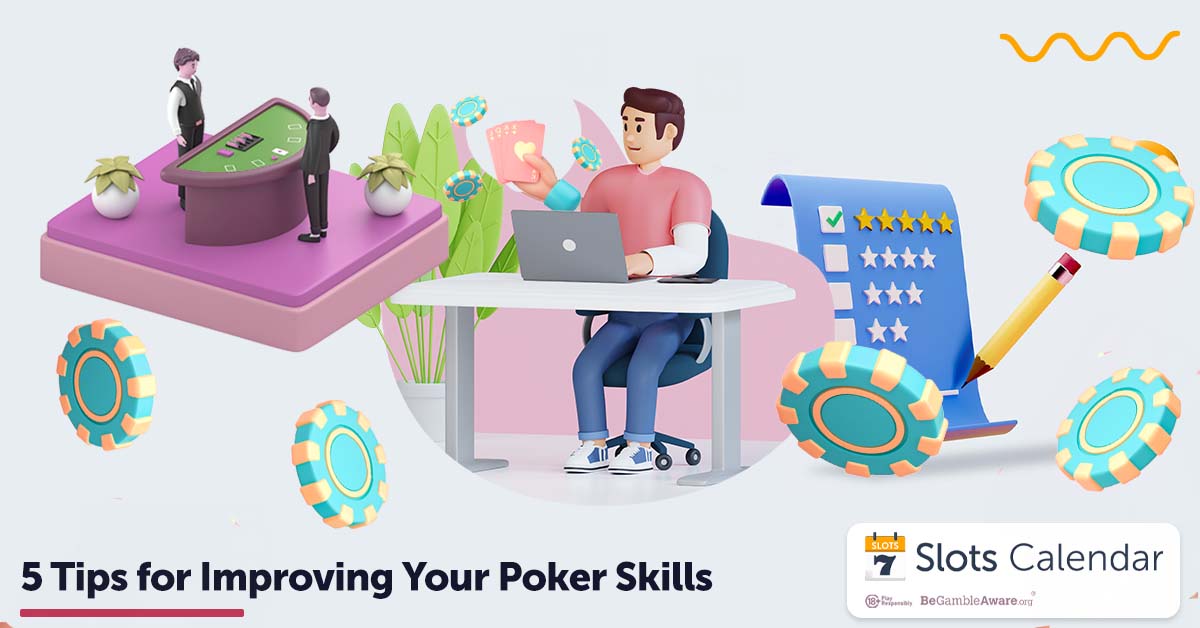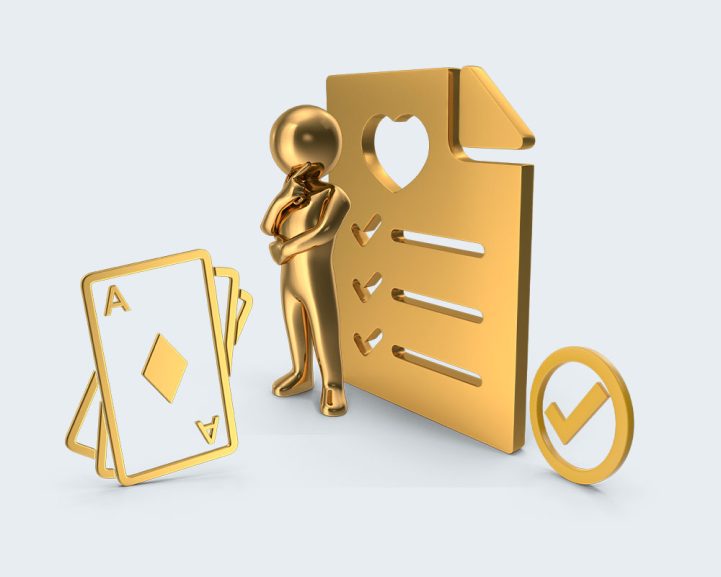Are you eager to master the game of poker? Then equip yourself with the confidence and know-how to be your own sharpest competitor. Poker is a strategic game that requires luck, endurance & skill. Whether you’re an active bettor or an aspiring pro, improving your poker skills takes focus & practice. In this blog post, we’ll be exploring the top tips for improving your poker skills. From understanding the basics of the game to managing your emotions at the table, we’ll cover everything you need to know to improve your poker skills and increase your chances of winning.
1. Understand the Basics
If you are new to the game of poker, there is no better place to start than by understanding the basics.
Poker is an exciting and challenging card game that requires a combination of strategy, luck, and skill. Understanding the rules and terminology can help you start your path towards becoming a successful poker player.
The Basic Rules and Concepts of Poker
Poker is played with a standard deck of 52 cards, and the goal is to win money or chips by making the best five-card hand or forcing all the other players to fold.
The game starts with a round of betting, followed by the distribution of cards. The players then have the option to either fold, call or raise the bet, depending on their hand.
The game continues with a series of betting rounds, followed by the showdown, where the player with the best hand wins the pot.
What Are Hand Rankings?
Hand rankings are essential in poker because they determine who wins the pot. A player must understand the different hand rankings to make informed decisions.
The highest poker hand is the Royal Flush, which consists of the Ace, King, Queen, Jack, and Ten of the same suit.
The next highest is the Straight Flush, any five consecutive cards of the same suit.
Other hands include Four of a Kind, Full House, Flush, Straight, Three of a Kind, Two Pair, One Pair, and High Card.
Here are some poker skill tips forn learning the rules and practising poker:
- Start with Simple Variations: If you are new to poker, start with simple variations such as Texas Hold’em. This will help you understand the basic rules and concepts of the game.
- Read Books: There are many books available on poker that explain the rules, strategies, and tips. Reading these books can help you improve your understanding of the game.
- Join a Poker Club: Joining a poker club can allow you to play with other players, learn new strategies, and get feedback on your gameplay.
- Watch Poker Games: Watching poker games on television or YouTube can help you learn from professional players, understand their strategies, and observe different game variations.
- Play Online: Playing poker online can help you practice your skills and gain experience in different game variations. There are many websites and apps available that offer online poker games.
- Practice with Friends and Family: Playing with friends and family can be a fun way to practice and improve your skills. It can also be an excellent way to experiment with different strategies and learn from each other.
- Learn Hand Rankings: Hand rankings are an essential concept in poker. Make sure you understand the different hand rankings and practice identifying them.
- Take Notes: Taking notes while playing can help you remember strategies and hands that worked well and those that didn’t. It can also help you analyse your gameplay and identify areas for improvement.
2. Study Poker Strategy
Studying poker strategy is another key component to improving your poker skills. While luck can play a role in the short term, a solid understanding of strategy can give you an edge in the long run.
Consistently applying quick strategies that boost your confidence and increase your chances of winning is essential to becoming a great poker player.
Your poker strategy is only valuable if you apply it consistently at the poker table, with every hand and every session contributing to your overall success.
The most successful poker players employ the same winning strategy repeatedly, regardless of their recent results or how they feel.
It’s important to remember that poker is a game of the long term, requiring ample time to build your bankroll and discover the ideal cash game or poker tournament strategy that suits your style.
Different Poker Strategies
How much skill is involved in poker? Poker is almost entirely a game of skill and strategy, and players can use several strategies to improve their chances of winning. Here are some of the most common types of poker strategies:
Pre-flop Strategy
This refers to the actions taken by players before the flop is dealt with. This includes choosing to start hands, making opening bets or raises, and deciding whether to call or fold.
Post-flop Strategy
Once the flop has been dealt with, players must adjust their strategy based on the new information provided by the community cards. This includes deciding whether to bet, check, call, or fold based on the strength of their hand and the cards on the board.
Bluffing Strategy
Bluffing is an essential aspect of poker, and it involves making bets or raises with a weaker hand to try and force opponents to fold their stronger hands. Good bluffing requires reading opponents and understanding their tendencies.
Positional Strategy
Position refers to a player’s location at the table relative to the dealer button. Players in later positions have more information about their opponents’ actions and can use this information to make better decisions.
Aggressive vs Passive Strategy
Some players prefer to play aggressively, making large bets and raise in an attempt to win pots quickly. Others prefer a more passive approach, calling more often and avoiding big bets unless they have a strong hand.
Tight vs. Loose Strategy
Tight players play fewer hands and only enter pots with strong hands, while loose players play more hands and are more likely to enter pots with weaker hands.
Choosing the right strategy depends on a player’s skill level and the types of opponents they are facing.
Table Image Strategy
The way a player presents themselves at the table can affect how opponents perceive them, and they can use it to gain an advantage.
A tight player who suddenly makes a large bet may be perceived as having a strong hand, while a loose player who suddenly folds may be seen as weak.
3. Practice, Practice, Practice
Practice is a crucial component to improving your poker skills. While studying strategy can give you a theoretical understanding of the game, it’s through practice that you’ll develop the instincts and experience necessary to make quick and effective decisions at the table.
Finding good practice opportunities is key to improving your poker skills. Fortunately, many different options are available, regardless of your skill level or location.
Try Online Poker
Online poker is one of the most popular and convenient ways to practice. Many online poker sites offer a variety of games and stakes, allowing you to find a game that suits your level and bankroll.
Additionally, online poker allows you to play from the comfort of your own home, making it easy to fit practice sessions around your schedule. You can also try new techniques while learning how to win video poker games.
Live Games All the Way
Most consider that trying out live games is the best way to improve your poker skills. Whether playing at a local casino or at home with friends, live games allow you to observe your opponents and develop your reading skills.
Moreover, playing live games can be a great way to build your bankroll, as you can often find softer games with lower stakes. Remember that bankroll management is an extremely important skill in poker, so practice that as well.
Look for Peaceful Environments
Home games can be a great option if you’re new to the game or looking to improve your skills in a low-pressure environment.
Many players host regular home games with friends or acquaintances, providing a fun and relaxed atmosphere to practice your poker skills.
Whether you have advanced poker skills or just looking to test your online poker skills, reviewing your hands and learning from your mistakes is vital.
This means analysing your play and identifying areas where you could have made better decisions. By reviewing your hands and learning from your mistakes, you’ll be able to continually improve your poker skills and become a more successful player.
4. Develop Good Habits
Does poker require skill? Well, yes, but besides this, it also requires several good habits. Developing good habits in poker is crucial for long-term success in the game. Good habits can help players make better decisions, avoid common mistakes, and maintain their mental and emotional balance during the ups and downs of the game.
Here are some good habits that every poker player should develop:
- Paying attention to opponents: One of the most critical habits in poker is observing and analysing opponents’ play. This helps players identify patterns in their opponents’ behaviour, which they can use to gain an advantage during the game.
- Managing bankroll: Proper bankroll management is essential for any poker player. This means setting a budget for the game, not risking too much of one’s bankroll on any single hand or session, and avoiding tilt (emotional reactions to losses).
- Taking breaks: Regular breaks during a long poker session can help players maintain focus and avoid fatigue or burnout. This also provides an opportunity to re-evaluate strategy and make any necessary adjustments.
- Reviewing hands: After each session, players should take the time to review the hands that they played, analysing their decisions and outcomes. This helps identify areas for improvement and avoid repeating mistakes.
- Staying disciplined: Poker requires discipline in sticking to a strategy and avoiding emotional reactions to bad beats or losses. Developing a habit of staying disciplined can help players maintain their focus and make better decisions.
- Practising good self-care: Poker can be mentally and emotionally taxing, so players should practice good self-care habits such as getting enough rest, eating well, and exercising regularly to maintain their energy and focus.
Developing good poker habits takes time and dedication, but elevating your game and achieving success is essential.
5. Manage Your Emotions
Managing emotions is another critical skill for success in poker. Emotions such as tilt, fear, and frustration can negatively affect players’ decision-making, causing them to make poor choices and lose money.
Here is an overview of some common emotional challenges in poker and tips for managing them:
Tilt
Tilt is an emotional state where a player becomes frustrated or angry after a bad beat or a series of losses. Tilt can cause players to play recklessly and make irrational decisions.
To manage tilt, players should take a break, walk away from the game, and practice relaxation techniques such as deep breathing or visualisation.
Fear
Fear is a common emotion in poker, especially for novice players who are afraid of losing money. Fear can cause players to play too conservatively, missing out on opportunities to make profitable plays.
Players should make logical, data-driven decisions to manage fear rather than letting their emotions drive their actions.
Frustration
Frustration can arise when a player cannot win pots or faces a particularly challenging opponent. Frustration can cause players to play aggressively, take unnecessary risks and make poor decisions.
To manage frustration, players should focus on their game rather than worrying about external factors outside their control.
The best piece of advice a pro can give someone who wants to know how to improve poker skills is to:
How to Control Your Emotions
- Practice mindfulness: Mindfulness is being fully present in the moment without judgment. Practising mindfulness can help players stay focused and calm during a game of poker.
- Take breaks: Taking regular breaks can help players manage their emotions and maintain their focus throughout a long poker session.
- Set limits: Setting limits on the amount of time or money spent playing poker can help players avoid becoming overly emotional or invested in the game.
- Seek support: Talking to other poker players or seeking advice from a coach or therapist can help players manage their emotions and improve their game.
- Practice self-care: Taking care of one’s physical and emotional health can help players manage their emotions and maintain their energy and focus during a game of poker.
Conclusion
If you’re still wondering “does poker require skill” or ”is poker luck or skill”, we’d say pretty much. All in all, improving your poker skills is an ongoing process.
With the right basics, strategy, practice and discipline – it’s possible to become a pro player.
Affirming these fundamentals will incorporate effective techniques and good habits into your game and are the best way to improve poker skills.
When you’ve reached this level, it’s essential to use our poker skills tips and manage your emotions to stay calm and continue making the best decisions on each hand you play.
Finally, remember always to play responsibly and with respect for your opponents, regardless of the stakes. Good luck!

 Free Slots
Free Slots











